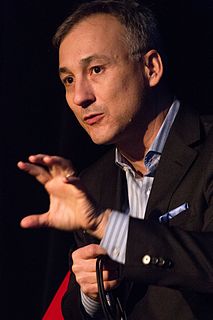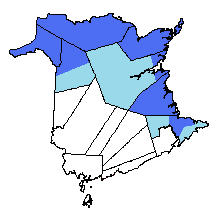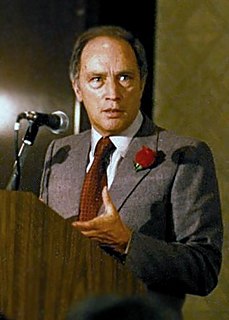
New Brunswick is one of the ten provinces of Canada. It is one of the three Maritime provinces and one of the four Atlantic provinces. It is the only province with both English and French as its official languages.

Bernard Lord is a Canadian lawyer, business executive and former politician. He served as the 30th premier of New Brunswick from 1999 to 2006. Lord was appointed as board chair of Ontario Power Generation in 2014.
The Official Languages Act is a Canadian law that came into force on September 9, 1969, which gives French and English equal status in the government of Canada. This makes them "official" languages, having preferred status in law over all other languages. Although the Official Languages Act is not the only piece of federal language law, it is the legislative keystone of Canada's official bilingualism. It was substantially amended in 1988. Both languages are equal in Canada's government and in all the services it controls, such as the courts.

The Parti Acadien was a political party in New Brunswick, Canada in the 1970s and 1980s. The party was founded in 1972 by Acadians who were upset over poorer living conditions in predominantly francophone areas of the province versus those areas dominated by anglophones. The economy of New Brunswick was concentrated in the cities of Fredericton, Saint John and Moncton, while the eastern and northern parts of New Brunswick, predominantly Francophone, was relatively poorer as a result of an economy based primarily on entrenched and seasonal commercial fishing and lumber industries.
This article presents the current language demographics of the Canadian province of Quebec.

The official languages of Canada are English and French, which "have equality of status and equal rights and privileges as to their use in all institutions of the Parliament and Government of Canada," according to Canada's constitution. "Official bilingualism" is the term used in Canada to collectively describe the policies, constitutional provisions, and laws that ensure legal equality of English and French in the Parliament and courts of Canada, protect the linguistic rights of English- and French-speaking minorities in different provinces, and ensure a level of government services in both languages across Canada.

Franco-Albertans are francophone residents of the Canadian province of Alberta. Franco-Albertans may also refer to residents of Alberta with French Canadian ancestry, although publications from the government of Alberta use the term Franco-Albertan to refer to its francophone residents. In the 2016 Canadian Census, there were 86,705 Albertans that stated their mother tongue was French. In the same census, there were 411,315 Albertans that claim partial or full French ancestry.

Quebec Sign Language, known in French as Langue des signes québécoise or Langue des signes du Québec (LSQ), is the predominant sign language of deaf communities used in francophone Canada, primarily in Quebec. Although named Quebec sign, LSQ can be found within communities in Ontario and New Brunswick as well as certain other regions across Canada. Being a member of the French Sign Language family, it is most closely related to French Sign Language (LSF), being a result of mixing between American Sign Language (ASL) and LSF. As LSQ can be found near and within francophone communities, there is a high level of borrowing of words and phrases from French, but it is far from creating a creole language. However, alongside LSQ, signed French and Pidgin LSQ French exist, where both mix LSQ and French more heavily to varying degrees.
The New Brunswick Confederation of Regions Party was a political party in the Province of New Brunswick, Canada. It was the only branch of the Confederation of Regions Party of Canada to win any seats. It held official status in the Legislative Assembly between 1991 and 1995, before losing all its seats in the following election.
Kelly Lamrock is a lawyer and political consultant in the province of New Brunswick, Canada. He was previously a Liberal member of the Legislative Assembly of New Brunswick for Fredericton-Fort Nashwaak, and Minister of Social Development in the New Brunswick cabinet before opening Lamrock's Law in Fredericton.
J. E. Michel Bastarache is a Canadian lawyer, businessman, and retired puisne justice on the Supreme Court of Canada.
Leonard C. Jones, Jr. was a Canadian lawyer and politician, who served as mayor of the city of Moncton, New Brunswick, between 1963 and 1974, and Member of Parliament for the constituency of Moncton between 1974 and 1979.

New Brunswick is one of Canada's three provinces of the Maritimes, and the only officially bilingual province in the country. The provincial Department of Finance estimates that the province's population in 2006 was 729,997 of which the majority is English-speaking but with a substantial French-speaking minority of mostly Acadian origin.

The law recognising the equality of the two linguistic communities of New Brunswick, or the more succinct Law 88, is a law adopted by the Legislative Assembly of New Brunswick, recognising the equality of the Anglophone and Francophone linguistic communities of the province.
Because the country contains two major language groups and numerous other linguistic minorities, in Canada official languages policy has always been an important and high-profile area of public policy.
Because Canada has, for over two centuries, contained both English- and French-speakers, the question of the language used in the administration of public affairs has always been a sensitive issue.
The language policies of Canada's province and territories vary between the provinces and territories of Canada. Although the federal government operates as an officially bilingual institution, providing services in English and French, several provincial governments have also instituted or legislated their own language policies.
The People's Alliance of New Brunswick (PANB) is an unregistered provincial political party in the Canadian province of New Brunswick. In the 2018 election, the party won three seats in the provincial legislature for the first time since its founding. The party advocated for "common sense" government and the abolition of the Office of the Commissioner of Official Languages, with a transfer of that office's responsibilities to the office of the provincial ombudsman. The party's platform has been described as "a mixture of economic conservatism, rural populism and opposition to some aspects of official bilingualism and duality".
English-speaking Quebecers are a linguistic minority in the francophone province of Quebec. According to the 2011 Canadian census, 599,225 people in Quebec declare English as a mother tongue. When asked, 834,950 people reported using English the most at home.